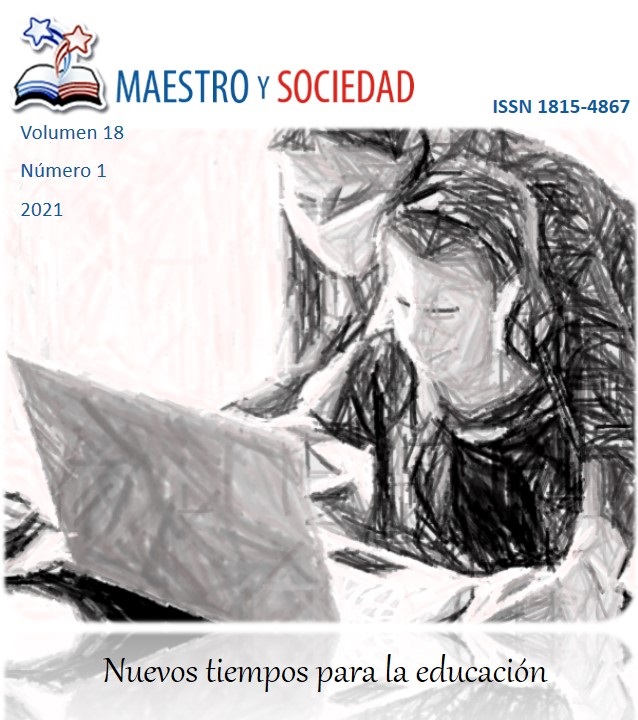Discourse markers in academic writing
Array
Palabras clave:
discourse markers, Academic Writing, students’ linguistic competence, typology of exercisesResumen
The complex process of writing academic documents has presented serious challenges to students of the English Language Major. The analysis of subjects like Academic Writing revealed this problematic situation finds its root in the insufficient treatment of discourse connectors in the syllabus implemented in the English Language Major. This information serves to the purpose of designing a proposal of a typology of exercises that supports the teaching-learning process of discourse connectors and enhances the students’ competence while using them in Academic Writing. To accomplish the mentioned tasks, several scientific methods are used, such as Analysis-Synthesis, Historical-Logical and Hermeneutic. Furthermore, the statistical technique serves to a qualitative and quantitative assessment of the results of the application and relevance of this contribution.
Citas
2. Antich, R. (1988). Metodología de la Enseñanza de Lenguas Extranjeras. La Habana: Pueblo y Educación.
3. Das, D. & Taboada, M. (2018). Signalling of coherence relations in discourse, beyond discourse markers. Research Gate. Discourse Processes 55(8), 743-770.
4. Eslami, Z. & Eslami-Rasekh, A. (2007). The use of discourse markers in three academic lectures. Asian EFL Journal, 9(1), 22-38.
5. Fraser, B. (1990). An approach to discourse markers. Journal of Pragmatics, (14), 383-395.
6. Ghanbari, N., Dehghani, T. & Reza, M. (2016). Discourse Markers in Academic and Non-academic Writing of Iranian EFL Learners. Theory and Practice in Language Studies, 6(7), 1451-1459.
7. Guo, F. (2015). A Review of Discourse Markers from the Functional Perspective. Journal of Arts and Humanities 04(04), 69-75.
8. Halliday, M. A. K. & Hasan, R. (1976). Cohesion in English. London: Longman.
9. Jonz, J. (1987). Textual cohesion and second language comprehension. Language Learning, 37(3), 409-431.
10. Kapranov, O. (2020). The Use of Discourse Markers in Academic Writing by In-Service Primary School Teachers of English. Prague Journal of English Studies 9(1).
11. Muhyidin, A. (2020). Does the writing exposition text ability correlate to reading habit and discourse markers mastery? Journal for the Education of Gifted Young Scientists, 8(2), 885-895.
12. Redeker, G. (1990). Ideational and pragmatic markers of discourse structure. Journal of Pragmatics (14), 367-381.
13. Tadayyon, M. & Vasheghani, M. (2017). Exploring Discourse Markers Used in Academic Papers: A Comparative Corpus-based Inquiry of Iranian and English Native Writers. Iranian EFL Journal 13(2), 130-150.
14. Zhang, M. (2016). A multidimensional analysis of metadiscourse markers across written registers. Discourse Studies, 18(2), 204-222.
Descargas
Publicado
Cómo citar
Número
Sección
Licencia
Esta revista proporciona un acceso abierto inmediato a su contenido, basado en el principio de que ofrecer al público un acceso libre a las investigaciones ayuda a un mayor intercambio global de conocimiento. Cada autor es responsable del contenido de cada uno de sus artículos. Los artículos pueden ser inéditos o estar disponibles previamente en servidores de preprints reconocidos por la revista. Sin embargo, no se permite la duplicación de la publicación o traducción de un artículo ya publicado en otra revista o como capítulo de un libro.
This journal provides immediate open access to its content, based on the principle that providing the public with free access to research supports a greater global exchange of knowledge. Each author is responsible for the content of each of their articles. Articles may be previously unpublished or available on preprint servers recognized by the journal. However, duplication of publication or translation of an article already published in another journal or as a book chapter is not permitted.
Esta revista oferece acesso aberto imediato ao seu conteúdo, com base no princípio de que oferecer ao público acesso gratuito à pesquisa contribui para um maior intercâmbio global de conhecimento. Cada autor é responsável pelo conteúdo de cada um de seus artigos. Os artigos poderão ser inéditos ou estar previamente disponíveis em servidores de preprints reconhecidos pela revista. No entanto, não é permitida a duplicação de publicação ou tradução de artigo já publicado em outro periódico ou como capítulo de livro.



























 Universidad de Oriente
Universidad de Oriente 